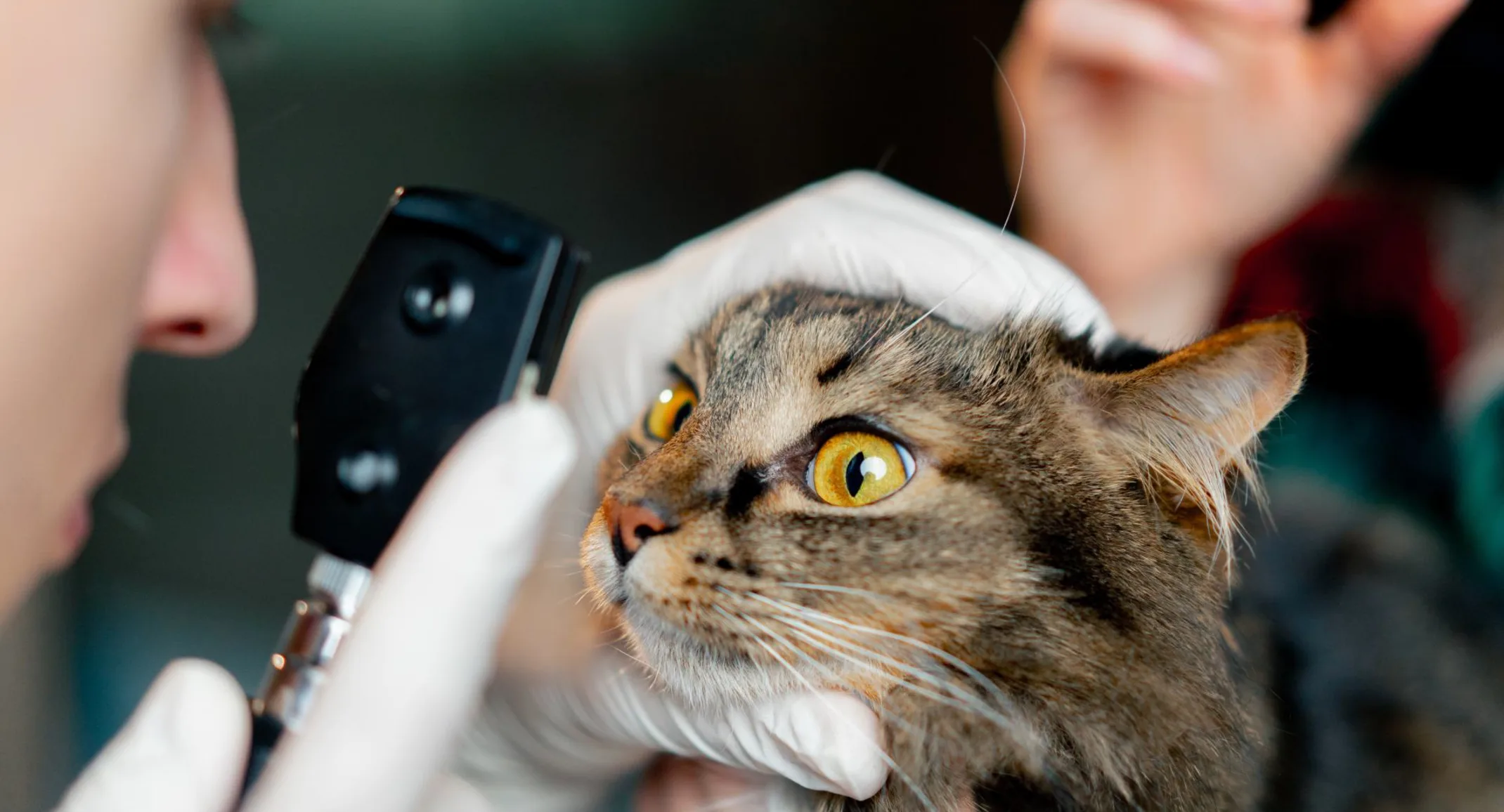Does Your Pet Need a Veterinary Ophthalmologist?
For Pet Owners

Did you know that dogs, cats, or other pets sometimes need to see an eye doctor? Veterinary ophthalmologists, like the team at Metropolitan Veterinary Hospital, are specialists in animal eye health. However, not all eye conditions need specialist care.
So, what’s the difference between an ophthalmologist and your primary vet’s care, and how do you know where to take your pet when an eye issue develops? We answer these and several other common questions about veterinary ophthalmologists so you know when and where to seek care.
Question: What is a veterinary ophthalmologist?
Answer: A veterinary ophthalmologist specializes in diagnosing and treating eye diseases in pets and other animals. While general practice veterinarians can manage routine eye health issues, an ophthalmologist has the advanced training, equipment, and surgical expertise to handle more complex conditions.
Q: How is a veterinary ophthalmologist different from my regular vet?
A: Your family veterinarian has general training in all aspects of veterinary medicine. During veterinary school, they learn to handle common eye problems, such as conjunctivitis, corneal ulcers, and dry eye, as well as diseases affecting other body systems.
In contrast, a pet eye specialist focuses solely on conditions affecting the eyes. After earning their veterinary degree, ophthalmologists complete three to four years of additional, intensive training and pass a rigorous examination administered by the American College of Veterinary Ophthalmologists (ACVO). Pet eye specialists diagnose and treat eye diseases with medicine and surgery.
Q: When should my pet see an eye specialist?
A: Subtle changes in behavior or the appearance of your pet’s eyes can indicate the need for an eye exam. Talk to your family veterinarian or call our team to determine if specialist care is appropriate if you notice:
Cloudiness or a bluish/white film on the eye
Redness, squinting, or excessive blinking
Eye discharge or excessive tearing
Pawing at the eye or face
A raised or visible third eyelid
Changes in pupil size or shape
Bumping into walls or furniture
Many eye problems present with similar symptoms. Prompt evaluation can help your veterinary team diagnose and treat the problem right away to protect your pet’s comfort and vision.
Q: What eye problems do veterinary ophthalmologists treat?
A: A pet eye specialist can diagnose and treat nearly any condition affecting a pet's or other animal’s eyes. Conditions we treat frequently include:
Cataracts – Cloudiness in the lens
Glaucoma – Elevated eye pressure
Corneal ulcers – Scrapes or scratches on the eye surface
Uveitis – Inflammation inside the eye
Eyelid disorders – Tumors or abnormal eyelid position
Retinal diseases – Degeneration or detachment
Dry eye – Lack of tear production
Eye health specialists also see pets with traumatic injuries, congenital abnormalities, and systemic diseases that affect the eyes.
Q: What should I expect during my pet’s visit?
A: Our board-certified veterinary ophthalmologists use state-of-the-art tools, exam techniques, and diagnostic tests to identify and treat pet eye conditions. Here’s a breakdown of what happens during a typical exam:
Slit-lamp biomicroscopy – A magnified light exam of the eye’s front portion
Tonometry – Measures eye pressure
Fluorescein stain – Detects corneal ulcers or scratches
Tear test – Measures tear production
Fundic exam – An examination of the back portion of the eye
When necessary, our team can also perform advanced diagnostics, including eye ultrasound, CT scanning, and electroretinography (i.e., retinal function testing).
Q: Does my pet need eye surgery?
A: Veterinary ophthalmologists perform complex eye surgeries regularly, often assisted by a large operating microscope to help them see tiny structures inside the eye or place intricate sutures.
Not all pets who visit a specialist need surgery. Some conditions can be managed with medications and routine recheck exams. However, other conditions are best treated with surgery, such as:
Cataracts
Tumors
Glaucoma
Eyelid disorders
Ingrown eyelashes
Trauma
Congenital disorders
Q: How does an ophthalmologist work with my regular vet?
A: An eye specialist doesn’t replace your primary veterinarian. Your vet coordinates all your pet’s healthcare needs, which includes collaborating with specialists. In many cases, your primary vet will refer you to see our specialists when they diagnose or suspect a complex eye condition or one they’re unfamiliar with.
We share findings with your primary veterinarian each time your pet visits for help managing an eye condition. Your primary vet can help with follow-up care in some cases and will continue to manage all your pet’s non-eye-health-related care.
Q: What should I do if I think my pet has an eye problem?
A: When in doubt, get it checked out. Eye problems can worsen quickly, may cause lasting damage, and can sometimes signal serious systemic health issues. If you notice anything abnormal, such as cloudiness, discharge, squinting, rubbing, or vision impairment, start by calling your regular veterinarian. If your pet develops a problem when your regular vet is unavailable, you should seek prompt care from an emergency or urgent care facility instead of waiting, since eye problems can worsen quickly.
The Metropolitan Veterinary Hospital team offers advanced diagnostics, surgeries, and compassionate care to all pets with eye health concerns. Contact us at our Akron or Cleveland East locations to learn more or request an appointment with our eye specialists.
